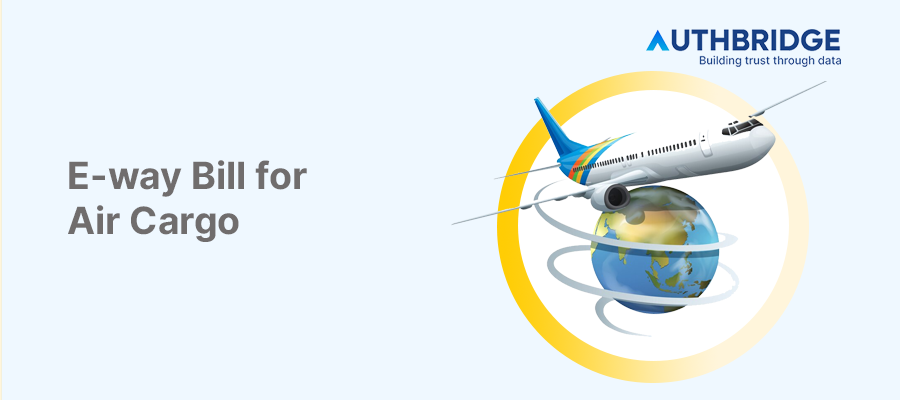Navigating The E-way Bill System For Air Cargo: A Comprehensive Guide

In India, the air cargo industry plays a vital role in facilitating the seamless and efficient movement of goods across the country and globally. To ensure transparency and compliance amidst this rapid growth, the e-way bill (EWB) system, introduced under the Goods and Services Tax (GST) regime in 2017, has become a crucial element. This comprehensive blog delves into E-way bills for air cargo, drawing insights and data from verified sources like the Central Board of Indirect Taxes and Customs (CBIC) website (https://www.cbic.gov.in/) and industry reports.
Understanding E-way Bills and Air Cargo
E-way Bills Explained
- An E-way bill is an electronic document required for the movement of goods exceeding ₹50,000 in value within India. It captures vital information about the consignment, including:
- Supplier details
- Recipient details
- Transporter details (including airline and flight information)
- Description of goods
- HSN code (Harmonized System Nomenclature code)
- Value of goods
Air Cargo and E-way Bills
- EWBs are mandatory for air cargo transportation when the value of the goods exceeds ₹50,000, irrespective of the destination within India.
- The EWB serves as a critical document for smooth movement through various stages, including:
- Airport security checks
- Customs clearance (if applicable)
- GST verification
Table 1: E-way Bill Applicability for Air Cargo
Scenario | E-way Bill Required? |
Value of air cargo exceeds ₹50,000 | Yes |
Value of air cargo below ₹50,000 | No |
Benefits of E-way Bills for Air Cargo:
- Enhanced Transparency: EWBs provide real-time visibility into the movement of air cargo, facilitating efficient tracking and reducing the risk of diversion or unauthorized activities.
- Improved Efficiency: Electronic documentation through EWBs streamlines processes at airports, reducing clearance times and facilitating faster delivery of goods.
- Simplified GST Compliance: EWBs act as a single document for GST purposes, streamlining compliance for businesses involved in air cargo transportation.
Additional Benefits:
- Reduced Paperwork: EWBs eliminate the need for multiple physical documents, simplifying the documentation process and minimizing administrative burden.
- Improved Data Accuracy: Electronic data entry minimizes errors compared to manual documentation, enhancing the accuracy of information for all stakeholders involved.
Challenges and Solutions for E-way Bill Management in Air Cargo:
Challenges:
- Timely generation of EWBs: Ensuring timely generation of EWBs is crucial to avoid delays in air cargo movement, which can lead to spoilage or cost implications.
- Accurate data entry: Accurate data entry of flight information, HSN codes, and other details is essential for smooth clearance and compliance.
- Integration with logistics systems: Integrating EWB functionalities with existing air cargo management and customs clearance systems can require technical expertise and resources.
Solutions:
- Invest in E-way bill management software: Utilize dedicated EWB software offering features tailored for air cargo, including pre-filled templates for airline information and automated data entry functionalities.
- Internal training and awareness: Conduct regular training sessions for employees involved in air cargo operations to ensure a clear understanding of EWB requirements and best practices.
- Seek professional guidance: Consulting with a qualified customs broker or tax professional can offer valuable assistance in navigating complex EWB requirements and ensuring compliance.
Table 2: Challenges and Solutions for E-way Bill Management in Air Cargo
Challenge | Description | Solution |
Timely EWB generation | Delays can lead to penalties and disruption of air cargo movement. | Utilize EWB management software with functionalities to schedule and automate EWB generation. |
Accurate data entry | Errors can cause delays and compliance issues. | Implement robust data validation tools within EWB software or systems, and conduct regular data verification. |
Integration with logistics systems | Can be challenging and require technical expertise. | Partner with technology providers to seamlessly integrate EWB functionalities with existing systems, ensuring efficient data exchange. |
Additional Considerations and Best Practices:
- Pre-validation of EWBs: Pre-validation of EWBs before initiating air cargo movement helps identify and address potential errors, minimizing delays at airport checkpoints.
- Maintaining proper records: As per GST regulations, businesses are required to electronically store EWBs for a minimum of six years. This ensures compliance and facilitates audits if required.
- Staying informed: Regularly monitor and keep updated on official CBIC notifications and amendments related to EWB requirements for air cargo. This ensures businesses adapt to any changes in regulations that might impact their operations.
Table 3: Additional Considerations and Best Practices for E-way Bill Management in Air Cargo
Action | Description | Benefits |
Pre-validate EWBs | Verify EWB information before air cargo movement. | Reduces delays, minimizes errors, improves compliance. |
Maintain proper records | Electronically store EWBs for six years. | Ensures compliance, facilitates audits. |
Stay informed | Monitor official updates on EWB requirements. | Ensures awareness of changes affecting air cargo operations. |
Conclusion:
By understanding E-way bill requirements and adopting effective management practices, businesses involved in air cargo can navigate the E-way bill system efficiently. This ensures compliance, enhances transparency, and facilitates the smooth and timely movement of goods within the Indian air cargo industry. As technology and regulations continue to evolve, staying informed and embracing technological solutions will be crucial for businesses to optimize their air cargo operations and maintain compliance in an ever-changing landscape.
Disclaimer: The information provided in this blog post is intended for general informational purposes only and should not be construed as professional legal or tax advice. It is recommended to consult with a qualified customs broker or tax professional for specific guidance on your business's E-way bill requirements and compliance strategies in the context of air cargo transportation.
Category

Abhinandan Banerjee
(Associate Manager - Marketing)
Abhinandan is a dynamic Product and Content Marketer, boasting over seven years of experience in crafting impactful marketing strategies across diverse environments. Known for his strategic insights, he propels digital growth and boosts brand visibility by transforming complex ideas into compelling content that inspires action.



